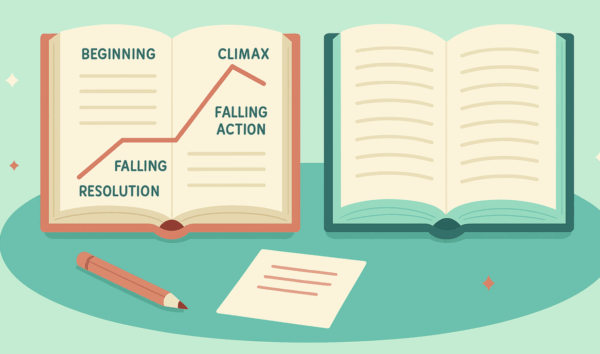Writing is more than simply arranging words—it’s an expression of your unique voice and personality. Your writing style can set you apart, making your work distinct and memorable. A strong writing style not only enhances readability but also deeply engages your audience, effectively conveying your message. Whether you’re crafting a blog post, an academic paper, or a novel, mastering your writing style is essential to becoming a better writer. In this article, we will explore practical writing tips to improve your writing style, covering basic components, sentence and paragraph structure, different writing types, and tips for developing a unique voice and achieving distinctive writing. Now, let’s explore the art of refining your writing!
What is Writing Style?
Writing style refers to the distinctive manner in which a writer expresses ideas through words. It’s not only about what you write but how you write it. Style encompasses various elements, including tone, word choice, sentence structure, and rhythm. These elements combine to create a unique signature that identifies a writer’s work.
Elements of Writing Style
1. Tone: The attitude conveyed by the writer through their choice of words and sentence structure. It can be formal, informal, serious, playful, or any other attitude.
2. Word Choice: The selection of words to convey meaning accurately and effectively. This includes vocabulary and the use of figurative language.
3. Sentence Structure: The way sentences are constructed, including their length and complexity. This can influence the flow and readability of the text.
4. Rhythm: The cadence and pace of the writing, created through the combination of sentence lengths and patterns.
Differences Between Writing Styles
Writing styles can vary widely among different writers and genres. For example, academic writing tends to be formal and structured, with a focus on clarity and precision. Creative writing, on the other hand, often embraces more varied sentence structures and expressive language to evoke emotions and imagery. Understanding these differences is crucial for adapting your style to fit different contexts and audiences.
The Importance of Developing a Unique Voice
Developing a unique voice is essential for standing out as a writer. Your voice is the personal touch that makes your writing distinctly yours. It’s about being authentic and letting your personality shine through your words. A unique voice helps you connect with your readers on a deeper level, making your writing more engaging and memorable. By experimenting with different styles and honing your skills, you can find and cultivate a voice that is uniquely yours, enhancing your ability to communicate effectively and leave a lasting impression on your audience. Incorporating practical writing tips into your practice can further help you refine your voice and make it resonate with your readers
Basic Components of Writing Style
In this next section, we’re going to go over the basic components of writing styles.
Sentence Structure
Sentence structure is a foundational element of writing style. It involves sentence construction and the variety within them. Short sentences are direct and punchy, ideal for emphasizing key points and keeping the reader’s attention. On the other hand, complex sentences can convey more nuanced ideas and show relationships between concepts. If you’re wondering, how can I simplify my writing style? using shorter sentences is a great place to start. Varying your sentence length and structure can make your writing more engaging and dynamic. Mastering sentence structure allows you to control the rhythm and flow of your text, making it easier for readers to follow your ideas.
Paragraph Structure
Paragraph structure plays a crucial role in how your writing is received. Short paragraphs are often more reader-friendly, especially in online content, where they can prevent overwhelming the reader and keep them engaged. They are effective for highlighting key points or making your writing more accessible. Conversely, longer paragraphs can be used to explore more complex ideas in depth, providing detailed explanations or descriptions. If you’re wondering how can I refine my writing style for better readability, balancing short and long paragraphs can help maintain the reader’s interest and enhance the readability of your writing
Word Choice and Vocabulary
Your choice of words significantly impacts your writing style. Using precise and varied vocabulary can make your writing more vivid and engaging. Opting for more formal language is appropriate for academic or professional writing, lending an air of authority and sophistication. In contrast, a casual tone can make your writing more relatable and approachable, which is ideal for blog posts or personal essays. Being mindful of your word choice helps in setting the right tone and connecting with your audience effectively. Expanding your vocabulary allows you to express your ideas more clearly and creatively, adding depth and richness to your writing.
By mastering these basic components—sentence structure, paragraph structure, and word choice—you can develop a writing style that is both effective and uniquely yours, ensuring your work stands out and resonates with your readers.
Improving Sentence Structure
One of the simplest yet most effective ways to enhance your writing style is by varying your sentence lengths. Short sentences are powerful tools for emphasis and can make your writing punchy and dynamic. They are easy to read and can quickly convey a point. Long sentences, on the other hand, allow you to elaborate on ideas, providing a more in-depth explanation or creating a flowing narrative. Mixing short and long sentences creates a rhythm that keeps your readers engaged and your writing lively.
Complex Sentences vs. Simple Sentences
Using a mix of complex sentences and simple sentences can add sophistication to your writing. Simple sentences are straightforward to understand, making them ideal for conveying basic ideas and facts. However, relying solely on simple sentences can make your writing seem choppy and monotonous. Complex sentences, which include clauses and more intricate structures, allow you to convey more detailed and nuanced information. They can show relationships between ideas and add depth to your writing. Balancing the two can help you achieve clarity while also demonstrating your ability to handle more advanced sentence structures.
Importance of Clarity and Conciseness
Regardless of the complexity of your sentences, clarity and conciseness should always be a priority. A sentence should make sense on the first read; otherwise, you risk losing your reader’s attention. If you’re wondering how can I simplify my writing style, focusing on being concise is a key strategy. Being concise means expressing your ideas in as few words as necessary without sacrificing meaning. This approach keeps your writing sharp and to the point, which is particularly important in professional and academic contexts
Active Voice vs. Passive Voice
Using active voice instead of passive voice can make your writing more direct and vigorous. In active voice sentences, the subject acts (e.g., “The researcher experimented”), whereas in passive voice sentences, the action is performed upon the subject (e.g., “The experiment was conducted by the researcher”). Active voice is typically clearer and more engaging, making your writing more dynamic and easier to read. However, the passive voice can be useful when the focus is on the action itself rather than the subject.
By applying these strategies—varying sentence lengths, balancing sentence types, prioritizing clarity and conciseness, and favoring active voice—you can greatly enhance your sentence structure, resulting in more engaging and effective writing.
Enhancing Paragraph Structure
Here we’re going to look at how you can enhance your paragraph writing structure.
Shorter Paragraphs for Readability
Short paragraphs are essential for maintaining readability, especially in digital content. They prevent readers from feeling overwhelmed by large blocks of text and make it easier to follow the flow of ideas. Breaking your text into short paragraphs can keep readers engaged, particularly when skimming through articles or blog posts. Shorter paragraphs also create more white space on the page, which can make your writing more visually appealing.
Topic Sentences and Transitions
Each paragraph should begin with a clear topic sentence that states the main idea. This helps the reader understand the paragraph’s purpose and sets the stage for the supporting sentences that follow. Effective transitions between paragraphs are crucial for maintaining the flow of your writing. Transition words and phrases like “furthermore,” “in addition,” and “on the other hand” guide the reader from one idea to the next, creating a smooth and logical progression.
Cohesion Within Paragraphs
Cohesion is key to ensuring each paragraph feels unified and coherent. This means that all sentences within a paragraph should relate to the main idea presented in the topic sentence. Use supporting details, examples, and explanations to reinforce your point. Maintaining cohesion ensures that your writing is clear and logically organized, making you a better writer. A well-structured paragraph not only conveys your ideas effectively but also keeps the reader engaged and interested.
By focusing on these elements—shorter paragraphs for readability, clear topic sentences and transitions, and cohesion within paragraphs—you can enhance your paragraph structure, making your writing more effective and enjoyable for your readers.
Developing a Unique Voice
Finding a way to express your voice through writing can feel liberating, like lifting a weight off your shoulders. Here, we’ll explore how you can best develop and showcase your unique voice.
Finding and Expressing Your Personality in Writing
Your unique voice sets you apart from other writers and makes your work instantly recognizable. It’s the blend of your personality, experiences, and perspectives, expressed through your writing. If you’re wondering what are some tips for refining my writing style, a great place to start is by writing as you speak. Let your natural rhythm and word choice flow onto the page. Don’t be afraid to show your personality—whether it’s witty, serious, or somewhere in between. The more confident you become in your writing, your unique voice will shine through. Remember, your voice is what will connect you with your readers on a deeper level.”
Balancing Formal and Casual Tones
Depending on your audience and purpose, you may need to adjust the tone of your writing. Formal language is often required in academic or professional contexts, where clarity and precision are crucial. Here, a well-structured, serious tone helps convey authority and respect. On the other hand, a more casual tone can make your writing feel more approachable and relatable, perfect for blog posts, personal essays, or content aimed at a general audience. Finding the right balance between these tones ensures that your writing is both effective and engaging. Practice switching between tones to become versatile and adaptable in your writing style.
Examples of Different Writing Voices
To illustrate the concept of different writing voices, consider the following examples:
1. Formal Voice: “The study’s findings unequivocally demonstrate the need for further research in this area, highlighting significant implications for future policy development.”
2. Casual Voice: “You won’t believe what the latest study found—turns out we need to look into this more, and it could change things up!”
3. Humorous Voice: “So, apparently, researchers have discovered something so groundbreaking that even my cat seems intrigued—time for more digging!”
Each of these styles caters to different readers and purposes. By experimenting with various voices, you can discover which ones resonate most with you and your audience. Developing a unique voice not only makes your writing more enjoyable but also helps you stand out in a crowded field. Keep practicing, and let your personality shine through your words!
Your Publishing Journey Awaits – Start NowPractical Tips for Different Types of Writing
There are many different types of writing, each with its unique language and style. Let’s look at the main types and tips you can use with each style.
Academic Writing: Precision and Formality
Academic writing demands a high level of precision and clarity. Using formal language is crucial as it adds a level of professionalism and credibility to your work. Here are some tips to enhance your academic writing:
- Stick to the Structure: Academic papers typically follow a clear structure—introduction, body, and conclusion. Ensure each section is well-organized and logically flows into the next.
- Be Clear and Concise: Avoid unnecessary jargon and complicated sentences. Your goal is to make sense and communicate your ideas effectively.
- Build Strong Arguments: Support your claims with evidence and logical reasoning. Use citations to back up your points and strengthen your argumentation.
Creative Writing: Unleash Your Imagination
Creative writing is all about expressing your imagination and connecting emotionally with your readers. Whether you’re writing a novel, a short story, or poetry, these tips can help:
- Use Sensory Details: Engage your readers by incorporating sensory details—what characters see, hear, smell, taste, and feel. This makes your story more vivid and immersive.
- Develop Characters and Plots: Create relatable and dynamic characters. Give them goals, conflicts, and growth throughout the story. Similarly, build a compelling plot with twists and turns that keep readers hooked.
Persuasive Writing: Convince and Influence
Persuasive writing aims to convince the reader to accept a particular viewpoint or take a specific action. Here’s how to make your arguments compelling:
- Understand Your Audience: Know who you’re writing for and tailor your message to their values and interests. This makes your arguments more relevant and impactful.
- Use Persuasive Techniques: Employ rhetorical devices like ethos (credibility), pathos (emotion), and logos (logic) to strengthen your case. Back up your points with solid evidence and examples.
- Be Confident: Write with conviction. If you believe in your argument, your readers are more likely to be persuaded.
Writing for Children: Simplicity and Engagement
Writing a children’s book requires a unique approach. The language should be simple yet engaging to capture the young readers’ attention. Here are some tips:
- Simplify Language: Use clear and straightforward language. Avoid complex words and long sentences. The goal is to be easily understood by children.
- Engage with Stories: Kids love stories that are fun and exciting. Create relatable characters and adventurous plots that stimulate their imagination.
- Interactive Elements: Consider adding interactive elements like questions, activities, or rhymes to make the reading experience more engaging and enjoyable.
Bringing It All Together
Different types of writing require different approaches, but the core principles of clarity, engagement, and audience awareness remain the same. Whether you’re crafting an academic paper, a creative piece, a persuasive argument, or a children’s book, these practical tips can help you improve your writing style and connect more effectively with your readers. Keep practicing, experimenting, and refining your techniques, and you’ll become a more versatile and confident writer.
Practical Exercises and Courses
Improving your writing style takes regular practice and the right tips. Try these exercises to hone your skills:
- Daily Journaling: Spend a few minutes each day writing about anything that comes to mind. This helps in developing a natural flow and discovering your unique voice.
- Imitation: Choose a passage from a writer you admire and try to emulate their style. This exercise can reveal new techniques and inspire your writing.
- Focused Freewriting: Set a timer for 10-15 minutes and write continuously about a specific topic. Don’t worry about grammar or structure—just let your ideas flow. This can spark creativity and improve your fluency.
Recommended Writing Courses
Taking writing courses can provide structured learning and professional guidance. Here are some popular options:
- Creative Writing: Courses like those offered by Coursera or MasterClass can help you learn storytelling techniques, character development, and more.
- Academic Writing: Websites like edX offer courses that focus on formal language and structured argumentation.
- Online Workshops: Many platforms, such as Writers.com, offer workshops where you can get feedback from peers and instructors, which is invaluable for growth.
Importance of Feedback and Revision
Receiving feedback is crucial for improving your writing. Don’t be afraid to share your first draft with others. Constructive criticism can highlight areas for improvement that you might not notice yourself. After receiving feedback, revision is where you refine your work, enhance clarity, and polish your style. Revising multiple times ensures that your final piece is the best it can be.
Your Journey to a Distinctive Writing Style
Improving your writing style is a journey that involves understanding the basic components, experimenting with different techniques, and continually refining your skills. If you’re wondering how can I simplify my writing style, focusing on clarity and conciseness is a great place to start. By focusing on sentence and paragraph structure, choosing the right words, and developing a unique voice, you can significantly enhance your writing abilities. Remember, the key to mastering your writing style is consistent practice and openness to feedback. Don’t be afraid to try new approaches and feel comfortable making mistakes along the way. Every writer’s style is unique, and it’s important to find what works best for you. As you continue to write and develop your skills, you’ll become a better writer, capable of engaging and resonating with your readers.
Embrace the process with confidence, and let your distinctive writing shine through your words. When you’re ready to share your masterpiece with the world, Spines is there to help with all of your publishing needs! Join us today!
FAQs – Writing Style
Q1: What is writing style?
Writing style refers to the distinctive manner in which a writer expresses ideas through words. It includes elements like tone, word choice, sentence structure, and rhythm, all of which combine to create a unique signature that identifies a writer’s work.
Q2: Why is developing a unique voice important?
Developing a unique voice is essential because it sets you apart from other writers. Your voice expresses your personality, making your writing relatable and memorable. It helps you connect with readers on a deeper level and makes your work stand out.
Q3: How can I improve my writing style?
Improving your writing style takes practice, but one of the best ways to start is by focusing on key components like sentence structure, word choice, and clarity. If you’re wondering what are some tips for refining my writing style, a great way to enhance your style is to experiment with different sentence lengths, use a mix of simple and complex sentences, and consistently refine your tone to match your audience.
Q4: How do I write more clearly and concisely?
Writing clearly and concisely means eliminating unnecessary words and avoiding complex sentence structures. If you’re asking how can I refine my writing style for better readability, prioritizing clarity and simplicity will help your audience follow your ideas more easily and keep them engaged throughout the text.
Q5: How does paragraph structure affect readability?
Paragraph structure plays a vital role in readability. Short paragraphs are ideal for online content as they break up text and make it more visually appealing. Using clear topic sentences and smooth transitions helps maintain a logical flow, keeping readers engaged.
Q6: What is the difference between active and passive voice?
Active voice makes your writing more direct and vigorous, as the subject acts (e.g., “The researcher experimented”). Passive voice focuses on the action itself, often making the sentence less direct (e.g., “The experiment was conducted by the researcher”). Active voice is usually clearer and more engaging.
Q7: How can you develop your unique writing voice?
To develop your unique voice, write as you speak. Let your natural rhythm and word choice flow onto the page. Don’t be afraid to show your personality through your writing—whether it’s witty, serious, or something else. The more confident you become, the more your voice will naturally emerge.
Q8: How can feedback and revision help improve your writing?
Feedback helps identify areas for improvement that you might miss. After receiving constructive criticism, revision is where you refine your work, clarifying ideas and polishing your style. Multiple rounds of revision ensure that your writing reaches its highest potential.
Q9: What techniques can I use to refine my writing style?
Refining your writing style involves experimenting with a variety of techniques. If you’re looking to improve your style, start by focusing on clarity and conciseness. Simplifying your sentence structure, eliminating unnecessary words, and avoiding jargon can make your writing more readable. Another important technique is varying sentence lengths, which can help maintain rhythm and keep your readers engaged. Additionally, developing a unique voice by writing authentically and confidently will set your work apart. Finally, consider paying attention to paragraph structure—using clear topic sentences and breaking up long paragraphs can enhance the flow and readability of your writing.







